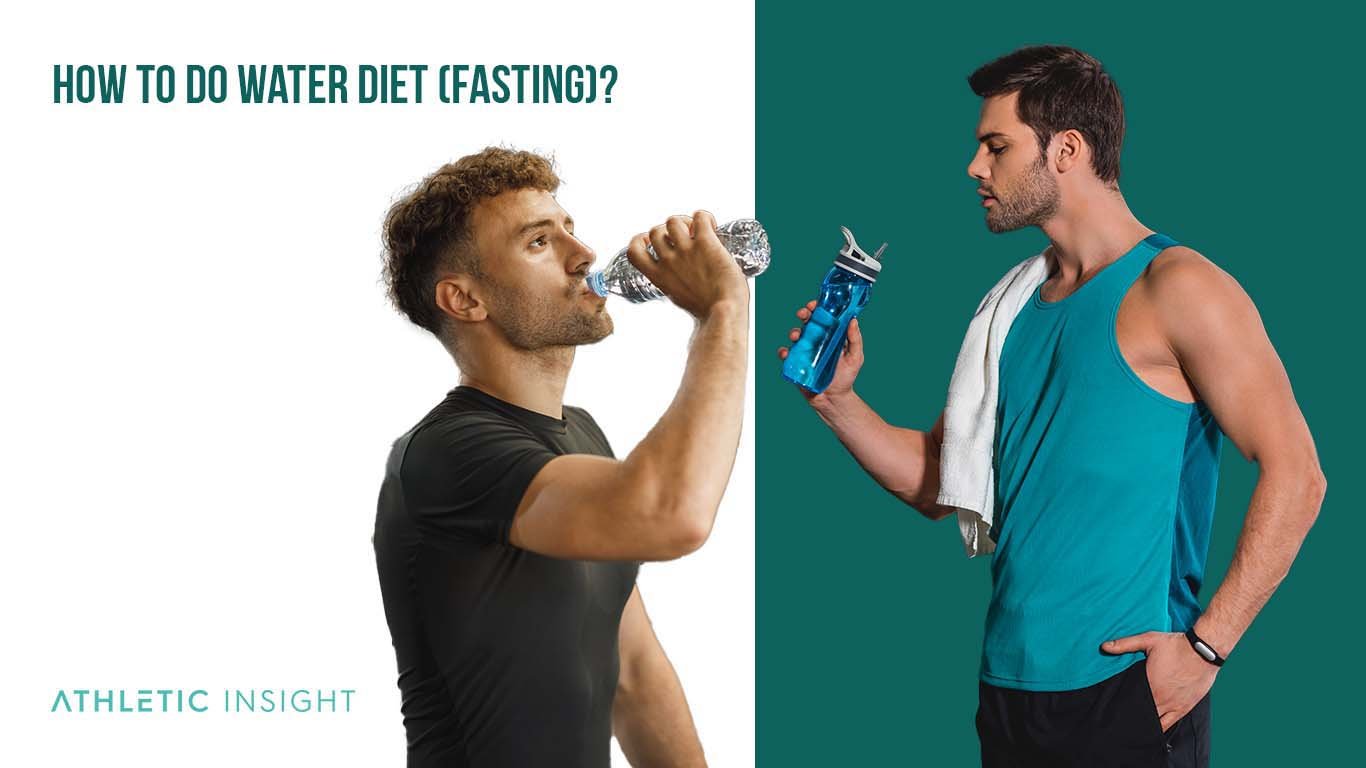The water diet, also known as water fasting, involves abstaining from all food and beverages except water for a certain period. This diet has gained popularity recently due to its potential health benefits, including weight loss, improved digestion, and reduced inflammation. However, it is essential to approach water fasting cautiously, as it can be challenging for beginners and may not be appropriate for everyone.
In this beginner’s guide, the basics of the water diet will be discussed, as well as its potential benefits and risks.
What is a Water Diet?
The Water Diet is a diet plan that involves drinking water as the sole source of nutrition. The Water Diet involves abstaining from all solid foods and other beverages, including juice, coffee, and tea, in favor of water. Supporters of the Water Diet believe water can help detoxify the body and promote weight loss by reducing calorie intake.

The Water Diet has various forms, including intermittent fasting, where individuals consume only water for certain periods during the day or week. Sometimes, you may add lemon, cucumber, or other natural flavorings to their water to enhance taste and add nutritional value.
While the Water Diet may result in rapid weight loss, it can also be dangerous if not followed correctly. Drinking excessive amounts of water can lead to hyponatremia. The disruption of the body’s electrolyte balance in this condition leads to symptoms such as nausea, headache, confusion, seizures, and even death in severe cases. Therefore, it is essential to consult a healthcare professional before starting the Water Diet or any other extreme diet plan.
How does Water Diet (Fasting) Work?
Here is a step-by-step process that explains how Water Diet (Fasting) affects our body and targets specific parts or organs:
- When one stops consuming food and other beverages and only drinks water, the body enters a state of ketosis, breaking down fat stores for energy.
- The liver plays a crucial role in breaking down fat and toxins. When one consumes a lot of carbohydrates and sugar, the liver can become overloaded, leading to fat accumulation and chronic conditions such as fatty liver disease.
- A water Diet (Fasting) can help reduce the workload on the liver and improve its function, leading to better overall health.
- During the initial stages of the Water Diet (Fasting), the body may experience a range of reactions, including headaches, fatigue, dizziness, and nausea. These symptoms are common and occur due to the body adapting to the new state of ketosis.
- As the body adjusts to the Water Diet (Fasting), these symptoms will subside, and individuals may experience increased energy levels, improved mental clarity, and better digestion.
What are the stages of a water diet?
The stages of the water diet involve a period of preparation, followed by a period of fasting and then a refeed.
- In the preparation phase, which occurs 48-36 hours before the fast, individuals prepare their bodies for the upcoming fast by consuming hemp seed oil.
- After 12 hours of fasting, the body enters the metabolic state, characterized by lower insulin levels and increased ketone production.
- After 18 hours of fasting, the body switches to fat-burning mode, which is when it begins to burn stored fat for energy.
- At the 24-hour mark, the body enters autophagy, a cellular cleaning process that breaks down damaged cells and recycles their components.
- At the 48-hour mark, growth hormone levels increase, which can help preserve lean muscle mass and support fat loss.
- At 54 hours of fasting, insulin levels drop to their lowest point, which promotes fat burning and helps regulate blood sugar levels.
- At 72 hours of fasting, the body begins to generate new immune cells, which can help strengthen the immune system.
- After the water fast, it’s important to refeed the body properly, and hemp seeds can be a good option as they provide healthy fats and protein while being gentle on the digestive system.
What are the health benefits of Water Diet (Fasting)?
A Water Diet (Fasting) benefits heart health as it can lower cholesterol levels, reduce inflammation in the body, and decrease blood pressure, reducing the risk of heart disease. Here are some of the health benefits of a Water Diet (Fasting).

- Good for Heart Health: A water diet may improve heart health by lowering blood pressure, reducing inflammation, and improving cholesterol levels, which can help lower the risk of heart disease.
- Reduces Cancer Risk: Some studies suggest that a water diet may help reduce the risk of certain types of cancer by reducing oxidative stress and inflammation in the body, which are both linked to cancer development.
- Prevents Type 2 Diabetes: Fasting can help regulate blood sugar levels by improving insulin sensitivity and reducing insulin resistance, which can help prevent or manage type 2 diabetes.
- Lowers Blood Pressure: A water diet can help lower blood pressure by reducing inflammation and promoting weight loss, which are both important factors in controlling blood pressure.
- Decreases Asthma Symptoms: Fasting may help decrease inflammation in the airways and improve lung function, which can help reduce asthma symptoms.
- Promotes Bone Health: Some studies suggest that fasting may help promote bone health by improving bone density and reducing the risk of osteoporosis. However, more research is needed in this area.
What are the health risks of a Water Diet (Fasting)?
The water diet, which involves consuming only water for a specific period, has gained popularity for its potential weight loss benefits. However, this type of fasting can also have significant health risks. Some of the risks associated with the water diet include an increased risk of stroke due to the reduction of essential nutrients for brain health.
A choline crisis may also occur during prolonged fasting, which can negatively impact liver and muscle function. Hair loss is another possible side effect of the water diet, as the body may not receive the nutrients necessary for hair growth. Despite these risks, the water diet can promote bone health by stimulating the production of human growth hormone, which helps form new bone tissue.
How to do Water Diet (Fasting)?
There are two steps to take while engaging in a water diet; water fast (24-72 hours), post fast (1-3 days). Below is a more in-depth explanation of both phases.

1. Water Fast (24–72 hours)
A crucial part of the Water Diet (Fasting) is the Water Fast, fasting for 24 and 72 hours on only water. The body enters a calorie deficit condition during this period, positively affecting health and well-being. Allowing the body to reach a state of ketosis, a metabolic condition where the body uses fat for energy instead of glucose from carbohydrates, is the primary goal of the fast water phase.
2. Post-Fast (1–3 days)
The post-Fast phase is a critical part of the Water Diet (Fasting), and it is essential to approach it carefully. It is vital to resume meals gradually after a prolonged fast. In assisting the body in re-adjust to eating solid foods, this phase typically lasts 1-3 days and comprises consuming light, readily digestible foods.
It is recommended to avoid consuming heavy, fatty, or processed foods during this period as they can be difficult to digest and may cause discomfort. Instead, emphasize nutrient-dense foods like fresh produce, healthy grains, lean meats, and fruits. Little meals throughout the day can also aid in controlling appetite and avoiding overeating. To stay hydrated and support the body’s natural detoxification process.
Who should do Water Diet (Fasting)?
A water Diet is not suitable for everyone, and it is essential to consider various factors before attempting it. People who are underweight, pregnant, or have a history of eating disorders should not attempt Water Diet (Fasting). It is also not recommended for people with chronic medical conditions like diabetes, heart disease, or kidney problems.
People taking medication or with a weakened immune system should also avoid Water Diet (Fasting) as it can harm their health. Before attempting a Water Diet (Fasting), it is advisable to consult a healthcare professional to determine if it is suitable for you.
What are the facts about Water Diet (Fasting)?
Here are five facts about Water Diet (Fasting) that you may not have known.
- A Water Diet (Fasting) involves consuming only water for a certain period, typically between 24 to 72 hours, to promote weight loss and detoxification. This diet aims to reset the body’s natural balance and flush out toxins from the system. It can also help improve digestion, boost energy levels, and improve mental clarity.
- Water is naturally zero calories, saturated fat, and cholesterol, making it a healthy and affordable alternative to other beverages and foods. Drinking water can help regulate body temperature, maintain healthy skin, and promote the proper function of organs and bodily systems.
- While Water Diet (Fasting) can lead to quick weight loss, it is not recommended as a long-term solution for weight management as it can be difficult to sustain and may have potential health risks. Fasting for prolonged periods can lead to nutrient deficiencies, dehydration, and other health complications. Approaching the Water Diet (Fasting) cautiously and following recommended guidelines is important.
- Water Diet (Fasting) has been associated with various health benefits, such as improved heart health, reduced cancer risk, and prevention of type 2 diabetes, among others. Studies have shown that fasting can help improve blood pressure, reduce inflammation, and promote longevity. However, more research is needed to fully understand the long-term effects of Water Diet (Fasting) on overall health and well-being.
- It is important to consult a healthcare professional before starting any fasting regimen, especially if you have underlying health conditions, take medications, or have a history of disordered eating. Staying hydrated and gradually breaking the fast with light, easily digestible foods is also essential. The experts recommend gradually reintroducing solid foods like fruits, vegetables, and whole grains to the digestive system after a Water Diet (Fasting). Drinking plenty of water is also crucial to prevent dehydration and maintain overall health.
What is the Result Before and After Water Diet (Fasting)?
Fasting on a water diet has been linked to some consequences on appearance, including changes in skin tone, skin health, and weight. After completing the water fast, some people have noted an improvement in their skin’s appearance and a decrease in acne and other skin issues.
This may be from the body’s detoxification processes during the fasting phase. However, there is little solid scientific proof to back up these assertions.
A water Diet (Fasting) can provide rapid weight loss, but it is only a temporary solution, and the weight may return once normal eating habits are resumed. It is not advised as a long-term weight loss method because it can be challenging to maintain and might pose health risks.
As for skin health, adequate hydration is crucial for maintaining healthy skin, and a Water Diet (Fasting) may help in this regard. However, it is important to note that other factors such as genetics, lifestyle, and skincare routine also significantly determine skin health.
Is Water Diet (Fasting) Safe?
Yes, a Water Diet (Fasting) can be safe for healthy individuals when done correctly and for a short duration. If done incorrectly, water fasting can cause dehydration, electrolyte abnormalities, and low blood sugar levels.
Throughout the fast, it’s important to maintain hydration and get enough electrolytes in. Health hazards such as vitamin deficits, muscle loss, and organ damage may be associated with a long-term or recurrent Water Diet (Fasting).
Thus, it is advised to only practice the water diet (fasting) for a short time, between 24 and 72 hours, and to break the fast gradually with simple foods. It’s crucial to pay attention to your body’s signals and break the fast if you feel any negative consequences.
Will Water Fasting Help You Lose Weight?
Yes, Water Fasting can help you lose weight, but it may not be a sustainable or healthy long-term solution. When you merely drink water, your body first uses its glycogen reserves for energy before switching to its fat reserves. Short-term weight loss is accelerated as a result of this.
However, the weight you lose while fasting can come back once you start eating normally. Water fasting may also cause muscle loss in addition to fat loss, which can slow down metabolism and make it more difficult to maintain weight loss over the long term.
Can you Use Tonic Water as an Alternative to Water Diet (Fasting)?
No, tonic water is not a suitable alternative for water during the Water Diet (Fasting) because it contains added sugars and calories that can interfere with the fasting process.
Tonic water includes quinine, which may cause headaches, nausea, and irregular heartbeats when drunk in high doses. To get the desired health advantages and weight loss effects from the Water Diet (Fasting), just drinking water is crucial.
What is the difference between a Fruit Diet from Water Diet (Fasting)?
The main difference between a fruit diet and a water diet (fasting) is that while a water diet (fasting) only involves drinking water and no other foods or beverages, a fruit diet allows for the consumption of various fruits. Although both diets can cause weight reduction, a fruit diet might not be as successful as a water diet for losing weight quickly (fasting).
A fruit diet can offer significant minerals and fiber that a water diet may lack (fasting). It is crucial to remember that a diet high in fruit may still be lacking in protein and several necessary vitamins and minerals. If the diet is not properly balanced and under a doctor’s supervision, there could be potential adverse effects like digestive problems or nutrient shortages.



